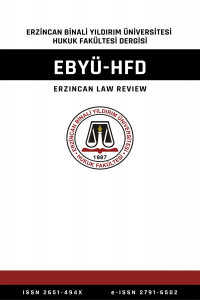Otantik Yorum
Hukuk mirasımızda önemli fakat büyük ölçüde unutulmuş bir konuyu, yani ‘yasaların yorumu, yasa koyucu tarafından yapılır (İngiliz hukuku bakımından ‘kuralı’ da denebilir)’ düşüncesini tartışarak, hukuki yorum ilkelerinin belirlenmesi meselesini ele alacağım. Otantik yorumun yasa koyucu tarafından yapılan yorum olduğu düşüncesi, Roma imparatorları Konstantin ve Jüstinyen ile, Bracton, Aquinas, İngiltere Kralı I. James, Hobbes ve Bentham’ı bir araya getirdi. Daha 17. yüzyılın başlarında, İngiltere'de yeni bir modern yaklaşım ortaya çıkıyordu. Bu modern yakla-şım, yorum yapma yetkisini yasama organından alıyor ve bağımsız mah-kemelere veriyordu. Ben, modern yaklaşımın lehinde bazı ikna edici genel argümanlar olduğunu ileri süreceğim. Fakat, yorumlama yetkisinin yasa koyucuya verilmesi gerektiği intibaını uyandıran bazı argümanları da or-taya koymakta yarar var. Ayrıca modern yaklaşımın bazı eksikliklerini de ortaya koymak gerekir; ben bu eksikliklerin, yargıçların yasaları nasıl yorumlayacaklarına dair zor soruyla yakından ilgili olduğunu iddia edeceğim.
Anahtar Kelimeler:
yasama yorumu, AB Adalet Divanı, Sturgeon kararı, yorum ilkeleri, Ortak Hukuk
Authentic Interpretation
I approach the identification of the principles of legal interpretation through a discussion of an important but largely forgotten strand in our legal heritage: the idea (and at some points in English law, the rule) that the interpretation of legislation is to be done by the lawmaker. The idea that authentic interpretation is interpretation by the lawmaker united the Roman emperors Constantine and Justinian with Bracton, Aquinas, King James I of England, Hobbes, and Bentham. Already in the early 17th century, a new modern approach was emerging in England. The modern approach separates the interpretive power from the legislative power, and allocates the interpretive power to an independent court. I argue that there are some cogent, general considerations in favour of the modern approach. But it is worth identifying the elements of good sense that made it seem that the interpretive power ought to be reserved for the lawmaker. And it is worth identifying the drawbacks in the modern approach; I argue that they are highly relevant to the complex question of how judges ought to interpret legislation.
Keywords:
interpretation of legislator, EU Court of Justice, Sturgeon case, principles of legal interpretation, Common Law,
___
- Alexy, R. A Theory of Legal Argumentation: The Theory of Rational Discourse as Theory of Legal Justification. Çev. R. Adler ve N. MacCormick, Oxford: Oxford University Press, 1989.
- Alexy, R. A Theory of Constitutional Rights. Çev. J. Rivers. Oxford: Oxford University Press, 2002.
- Alexy, R. Balancing, Constitutional Review, and Representation. International Journal of Constitutional Law, 3(4): 572–81, 2005.
- Alexy, R. The Dual Nature of Law. Ratio Juris, 23(2): 167–82, 2010.
- Alexy, R. Some Reflections on the Ideal Dimension of Law and on the Legal Philosophy of John Finnis. American Journal of Jurisprudence 58(2): 97–110, 2013.
- Alexy, R. Constitutional Rights and Proportionality. Revus 22: 51–65, 2014.
- Austin, J. The Province of Jurisprudence Determined, or, the Philosophy of Positive Law. 2nd ed. London: John Murray, 1861.
- Baker, J. H. The Reinvention of Magna Carta 1216–1616. Cambridge: Cambridge University Press, 2017.
- Bentham, J. Principles of the Civil Code. In vol. 1 of The Works of Jeremy Bentham. Ed. J. Bowring, 297–364, 1843, Edinburgh: William Tait. Digitized by the Classical Utilitarianism Web Site (CUWS) at www.laits.utexas.edu/poltheory/bentham/ pcc/index.html.
- Berner, K. Authentic Interpretation in Public International Law. Zeitschrift für ausländisches öffentliches Recht und Völkerrecht (Za-öRV) 76: 845–78, 2016. http://www.zaoerv.de/76_2016/76_2016_4_a_845_878.pdf.
- Bracton, H. de. De Legibus et Consuetudinibus Angliae (On the Laws and Customs of England). Trans. Samuel E. Thorne. Buffalo, NY: Wil-liam S. Hein. (Orig. pub. ca. 1235.), 1997.
- Brand, P. A. The Earliest English Law Reports. London: Selden Society, 2005.
- Brand, P. The Judicial Interpretation of Legislation in Later Thirteenth and Early Fourteenth Century England. In Law and Authority in British Legal History, 1200–1900. Ed. M. Godfrey, 1–12. Cambridge: Cambridge University Press, 2016.
- Dyzenhaus, D. How Hobbes Met the “Hobbes Challenge.” Modern Law Review 72(3): 488–506, 2009.
- Endicott, T. Arbitrariness. Canadian Journal of Law & Jurisprudence 27(1): 49–71, 2014a.
- Endicott, T. Proportionality and Incommensurability. In Proportionality and the Rule of Law. Ed. G. Huscroft, B. Miller, and G. Webber, 311–42. Cambridge: Cambridge University Press, 2014b.
- Endicott, T. Comity among Authorities. Current Legal Problems 68(1): 1–26, 2015.
- Falcone, G. The Prohibition of Commentaries to the Digest and the Antecessorial Literature. Subseciva Groningana 9: 1–36, 2014.
- Finnis, J. Aquinas: Moral, Political, and Legal Theory. Oxford: Oxford University Press, 1998.
- Hart, H. L. A. The Concept of Law. Ed. P. A. Bulloch, J. Raz, and L. Green. 3rd ed. Oxford: Oxford University Press, 2012.
- Hobbes, T. Leviathan. Ed. R. Tuck. Cambridge: Cambridge University Press, 1991.
- Linderfalk, U. On the Interpretation of Treaties: The Modern International Law as Expressed in the 1969 Vienna Convention on the Law of Treaties. Dordrecht: Springer, 2007.
- Kantorowicz, E. H. The King’s Two Bodies: A Study in Medieval Political Theology. Princeton, NJ: Princeton University Press, 1957.
- McIlwain, C. H. ed. The Political Works of James I. Cambridge, MA: Harvard University Press, 1918.
- Orakhelashvili, A. The Interpretation of Acts and Rules in Public International Law. Oxford: Oxford University Press, 2008.
- Plucknett, F. T. Statutes & Their Interpretation in the First Half of the Fourteenth Century. Cambridge: Cambridge University Press, 1922.
- Pound, R. Sources and Forms of Law. Notre Dame Lawyer 21(4): 247–314, 1946.
- Usher, R. G. James I and Sir Edward Coke. The English Historical Review 18(72):664–75, 1903.
- ISSN: 2651-494X
- Yayın Aralığı: Yılda 2 Sayı
- Başlangıç: 2002
- Yayıncı: Erzincan Binali Yıldırım Üniversitesi
